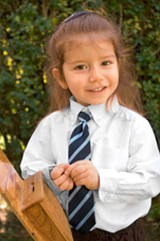
Angel Kids
Rabbi Arush reminds us that even the great Rabbi Akiva said that there was no one, even in his holy generation, who was on the level to give rebuke to others...

My Rebbe, Rabbi Shalom Arush, warns us not to rebuke our children. He raised his own beautiful, successful children without criticizing or rebuking them at all. With emuna, Rav Arush knew that if he prayed for his children and did teshuva (repentance) for every personal defect that he saw in them that they would excel.
One might object saying that this is all well and good for Rabbi Shalom Arush, but we are not tzaddikim and we do not have his strength to refrain from making critical remarks. To this the Rebbe gives you his promise that if he could do it so can you. The truth is that Rav Arush is not expecting us to be on his level. His level is actually much higher than this – he just sees capabilities in us that we do not see in ourselves.
Rav Arush’s writings about child-rearing are completely consistent with how he raised his own children. The Rebbe calls his book Garden of Education to show that the only way to raise healthy children is to  simultaneously prepare ourselves to be parents. Rav Arush does not expect perfection from us, he simply wants us to acknowledge the futility of forcing values and traits onto our children that we do not possess. The Rav prays for all of us to have the wisdom to avoid the pitfalls of psychological and even religious approaches to parenting that focus exclusively on the child.
simultaneously prepare ourselves to be parents. Rav Arush does not expect perfection from us, he simply wants us to acknowledge the futility of forcing values and traits onto our children that we do not possess. The Rav prays for all of us to have the wisdom to avoid the pitfalls of psychological and even religious approaches to parenting that focus exclusively on the child.
How can one who is still being ruled by arrogance and self-centeredness expect his child to listen to anything that he has to say about the importance of humility and loving kindness. How can one who is constantly competing with others and looking at others with an evil eye teach his children to believe in themselves; have the courage to find their own path in life and to judge others favorably. It is not possible.
Michael demanded respect from his children. He felt justified in scolding them for sitting in his seat, interrupting him when he was speaking or for openly disagreeing with his religious views. Michael believed that it was necessary to instill fear of his authority into his children in order for them to be successful in life even though he himself had a problem with obedience to authority. In fact while serving in the army, Michael was brought up on charges of disobeying his commanding officer and was later fired from numerous jobs for the same defect of character. Little did Michael realize how deeply his children loved him when they were young, and wanted desperately to please him – but that could not last. When those children grew up they wanted nothing to do with Michael even though he changed. Michael’s wife, who was quiet for all those years, now rages openly at him and sides with her children who never call their father. To Michael’s great credit he is learning to see that this is all from Hashem and is doing a very deep and penetrating teshuva on himself. What a gift Hashem has given to this man. He has become an incredibly strong servant of Hashem. It does not look like Michael will ever stop doing teshuva until his children return to his loving, repentant arms. May it be so!
Suri is a mother of five. Her daughter, Chavie, was 12 years old when she had not yet taken an interest in cleaning her room and organizing her possessions. Suri wisely refrained from making an issue of her daughter’s unmanageability – instead she prayed for her daughter to want to become more organized. Suri spoke back to the evil inclination who told her that she should resent her daughter for the constant mess and inconvenience that this caused her. Instead, Suri thought about serving Hashem. Whenever she had to bend down and sort through her daughter’s pile with the bus honking in the background, she thought about how patient Hashem has been with her. Suri did her best to keep some order to her daughter’s room and continued to pray that her daughter would follow suit. One day Suri came into her daughter’s room and it was immaculate. Chavie was proudly finding a place for everything that she owned.
Although Chavie’s self-management skills had not been on age-level, because she merited to have a mother like Suri, who followed Rabbi Arush’s advice, she never lost any self-esteem because of her delays. Although Chavie sometimes became frustrated when she could not find something, she accepted herself as a “messy girl” even with a sense of humor. At the right time – when Hashem decided – Chavi ran out of patience with herself – changed completely, and had absolutely no reason to rebel.
Rabbi Arush reminds us that even the great Rabbi Akiva said that there was no one, even in his holy generation, who was on the level to give rebuke to others. To this Rebbe Nachman of Breslev added that one needs to be on the level of Moses to be critical of others; otherwise, he does great harm to those he is seeking to help.
At first glance you might think that Rav Arush is simply using what is termed social modeling or vicarious modeling – a method used in psychotherapy whereby the child learns by imitation alone, G-d forbid. The truth is that we have no idea why children who are not punished or reprimanded in any way grow up to be angels – it completely defies logic that parents who do teshuva (repentance) for every undesirable trait that they see in their children – knowing that they must also possess that exact defect of character – have kids like Rav Arush’s – but emuna defies logic.
Even if you try to parent like Rav Arush does and do not always succeed, he promises you that if you are pray hard to really want to follow his teachings that it will be as if you actually are! Try it for 30 days and stay in touch.










Tell us what you think!
Thank you for your comment!
It will be published after approval by the Editor.